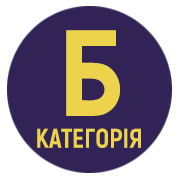EDUCATIONAL COMPONENT “INTERNATIONAL ETIQUETTE AND PROFESSIONAL ETHICS OF A SPECIALIST IN THE FIELD OF INTERNATIONAL EDUCATIONAL ACTIVITIES” IN THE SYSTEM OF PROFESSIONAL TRAINING OF MASTER’S DEGREE APPLICANTS
DOI:
https://doi.org/10.32782/ped-uzhnu/2025-9-4Keywords:
professional training, master’s degree applicants, academic discipline “International Etiquette and Professional Ethics of a Specialist in the Field of International Educational Activities”, general competencies, professional competencies, activitiesAbstract
The article presents the purpose and objectives of the academic discipline “International Etiquette and Professional Ethics of a Specialist in the Field of International Educational Activities”, which is studied by applicants for the second (master’s) level of higher education (specialties 011 Educational and Pedagogical Sciences, 073 Management) in both full-time and part-time forms of study at V. N. Karazin Kharkiv National University. The content of Module 1 “International Etiquette” is disclosed, including theories of etiquette in the context of sociocultural specificities; international etiquette within the system of business communications in European/ Asian countries, the United States of America, and Australia. Module 2 “Professional Ethics of a Specialist in the Field of International Educational Activities” covers: principles of national educational activity as the foundation of state policy in the educational sphere; international cooperation in the education system; moral and ethical concepts; types of professional ethics; key ideas of pedagogical ethics in domestic and foreign scientific thought; the ethical component of the image of pedagogical, academic-pedagogical, and academic staff of higher education institutions; ethical foundations of interpersonal communications in international educational activities; the culture of communication among academic staff within the context of international educational activities; professional ethics of university leadership in international educational cooperation. The article emphasizes the general and professional competencies developed in master’s students through lectures, practical assignments, and independent work within the course “International Etiquette and Professional Ethics of a Specialist in the Field of International Educational Activities”. The effectiveness of assignments is highlighted as a didactic tool for supporting students’ independent learning within this educational component. Activities have been developed for each topic of the course, taking into account the subject-specific and scientific contexts of the future professional activity of specialists in the field of international educational engagement.
References
TamozhskaI., Rud O., Medynskyi S., Polukhtovych T., Kuzemko N., Rudenko-Kraievska N. The Educational Paradigm as a Conceptual Model of Developing Competencies During Learning. Revista Romaneasca Pentru Educatie Multidimensionala, 2024. 16 (2). 152–164. DOI: https://doi.org/10.18662/rrem/16.2/851
Березовська Л. І. Формування професійно-етичної компетентності майбутніх вихователів закладів дошкільної освіти. Науковий вісник Південноукраїнського національного педагогічного університету імені К. Д. Ушинського. 2023. (144). С. 128–134. DOI: https://doi.org/10.24195/2617-6688-2023-3-20
Василевська Т. Професійна етика в підтримці цінностей моралі. Університетська кафедра: альманах. Київ : КНЕУ, 2017. № 7. С. 55–64.
Горохолінська І., Бродецький О. Етична підготовка фахівців у закладах вищої освіти: ідейно-ціннісна мотивація та вимоги стандартів вищої освіти. Освітологія. 2021. Вип. 10. С. 15–23. DOI: https://doi.org/10.28925/2226-3012.2021.102
Іваненко І. Професійна підготовка аспірантів у закладах вищої освіти: морально-психологічний аспект. Молодий вчений. 2023. 10 (122). С. 135–139. DOI: https://doi.org/10.32839/2304-5809/2023-10-122-27
Карпенко К. І., Дейнека В. В. Професійна етика вищої школи: навч. посібн. для здобувачів вищої освіти за спеціальністю «Освітні педагогічні науки». Харків : ХНМУ, 2024. 72 с.
Кузнецова І., О. Рубанець. Етичний складник комунікацій у мережевому освітньому середовищі. Вища освіта України. 2023. Ви. 1. С. 80–86. DOI: https://doi.org/10.32782/NPU-VOU.2023.1(88).10
Москаленко А. М. Моральна регуляція діяльності управлінців закладами освіти: структура та особливості. Академічні візії. 2025. Вип. 39. С. 1–12. DOI: https://doi.org/10.5281/zenodo.14825155
Мястковська М., Кобилянська І. Етичні аспекти підготовки фахівців: відповідальність за якість освіти та розвиток професійної етики. Педагогіка безпеки. 2024. 9 (1). С. 24–30. DOI: https://doi.org/10.31649/2524-1079-2024-9-1-024-030
Столяренко О. В., Столяренко О. В., Московчук О. С. Формування мовної культури як основи професійної етики майбутнього фахівця. Наукові інновації та передові технології. 2025. 3 (43). С. 1464–1472. DOI: https://doi.org/10.52058/2786-5274-2025-3(43)-1464-1472
Таможська І. В., Смирнова І. М., Перетяга Л. Є. Вплив цифрових технологій на формування академічної доброчесності майбутніх фахівців у закладах вищої освіти. Вісник Міжнародного економіко-гуманітарного університету імені академіка Степана Дем’янчука. Серія: Педагогіка та психологія. 2025. Вип. 2. С. 161–167. DOI: https://doi.org/10.32782/3041-2021/2025-2-24
Хоружа Л. Л. Новак М. А. Формування професійної етики викладача вищої школи у процесі розв’язання педагогічних задач. Молодий вчений. 2021. 10(98). С. 296–298. DOI: https://doi.org/10.32839/2304-5809/2021-10-98-61








